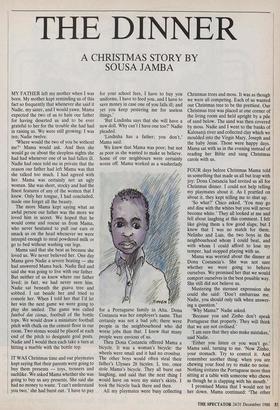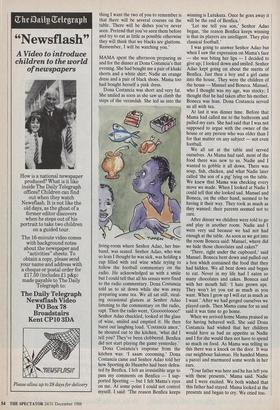THE DINNER
A CHRISTMAS STORY BY SOUSA JAMBA
MY FATHER left my mother when I was born. My mother kept reminding us of this fact so frequently that whenever she said it Nadie, my sister, and I would yawn. Mama expected the two of us to hate our father for having deserted us and to be ever grateful to her for the trouble she had had in raising us. We were still growing: I was ten; Nadie twelve.
'Where would the two of you be without me?' Mama would ask. And then she would go on about the sleepless nights she had had whenever one of us had fallen ill. Nadie had once told me in private that the reason our father had left Mama was that she talked too much. I had agreed with her. Mama was certainly not an ugly woman. She was short, stocky and had the finest features of any of the women that I knew. Only her tongue, I had concluded, made one forget all the beauty.
The more Mama kept saying what an awful person our father was the more we loved him in secret. We hoped that he would come and rescue us from Mama, who never hesitated to pull our ears or smack us on the head whenever we were intrepid enough to steal powdered milk or go to bed without washing our legs.
Mama said that she beat us because she loved us. We never believed her. One day Mama gave Nadie a severe beating — she had answered Mama back. Nadie fled and said she was going to live with our father. But neither of us knew where our father lived; in fact, we had never seen him. Nadie sat beneath the guava tree and sobbed. I sat beside her and tried to console her. When I told her that I'd let her win the next game we were going to play she smiled. The game was called futebol das cisnas, football of the bottle tops. We would draw a miniature football pitch with chalk on the cement floor in our room. Two stones would be placed at each end of the pitch to designate goal posts. Nadie and I would then each take a turn at hitting a marble with the bottle top.
IT WAS Christmas time and our playmates kept saying that their parents were going to buy them presents — toys, trousers and suchlike. We asked Mama whether she was going to buy us any presents. She said she had no money to waste. 'I can't understand you two,' she had burst out. 'I have to pay for your school fees, I have to buy you uniforms, I have to feed you, and I have to save money in case one of you falls ill; and yet you keep pestering me for useless things.'
'But Lindinha says that she will have a new doll. Why can't I have one too?' Nadie pleaded.
`Lindinha has a father; you don't,' Mama said.
We knew that Mama was poor; but not as poor as she wanted to make us believe. Some of our neighbours were certainly worse off. Mama worked as a washerlady for a Portuguese family in Alta. Dona Costancia was her employer's name. That certainly was not a bad job; there were people in the neighbourhood who did worse jobs than that. I knew that many people were envious of us.
Then Dona Costancia offered Mama a bicycle. It was a woman's bicycle: the wheels were small and it had no crossbar. The other boys would often steal their father's Ulysses 28 bicyles. I, too, once stole Mama's bicycle. They all burst out laughing, and said that the next thing I would have on were my sister's skirts. I took the bicycle back there and then.
All my playmates were busy collecting Christmas trees and moss. It was as though we were all competing. Each of us wanted our Christmas tree to be the prettiest. Our Christmas tree was placed at one corner of the living room and held upright by a pile of sand below. The sand was then covered by moss. Nadie and I went to the banks of Kalosanji river and collected clay which we moulded into the Virgin Mary, Joseph and the baby Jesus. Those were happy days. Mama sat with us in the evening instead of reading her Bible and sang Christmas carols with us.
FOUR days before Christmas Mama told us something that made us all but leap with joy: Dona Costancia had invited us all for Christmas dinner. I could not help telling my playmates about it. As I prattled on about it, they kept telling me to shut up.
'So what?' Chico asked. 'You may go and dine with the whites but you will never become white.' They all looked at me and fell about laughing at this comment. I felt like giving them a few good slaps; but I knew that I was no match for them, Nelinho and Luis, the two boys in the neighbourhood whom I could beat, and with whom I could afford to lose my temper, had stopped playing with us.
Mama was worried about the dinner at Dona Costancia's. She was not sure whether we were going to behave ourselves. We promised her that we would comport ourselves in the best possible way. She still did not believe us.
Mustering the sternest expression she could she said: 'Don't embarrass me. Nadie, you should only talk when answer- ing a question.'
'Why Mama?' Nadie asked.
'Because you and Zinho don't speak Portuguese that properly. They will think that we are not civilised.'
'I am sure that they also make mistakes,' said Nadie.
'Either you listen or you won't go.' Mama said, turning to me. 'Now Zinho, your stomach. Try to control it. And remember another thing: when you are chewing your food try to make no noise.
Nothing irritates the Portuguese more than sitting at a table with someone who chews as though he is clapping with his mouth.'
I promised Mama that I would not let her down. Mama continued: 'The other thing I want the two of you to remember is that there will be several courses on the table. There will be dishes you've never seen. Pretend that you've seen them before and try to eat as little as possible otherwise they will think that we blacks are gluttons. Remember, I will be watching you.'
MAMA spent the afternoon preparing us and for the dinner at Dona Costancia's that evening. She had bought me a pair of khaki shorts and a white shirt; Nadie an orange dress and a pair of black shoes. Mama too had bought herself a pink dress.
Dona Costancia was short and very fat. She smiled as soon as she saw us climb the steps of the verandah. She led us into the living-room where Senhor Adao, her hus- band, was seated. Senhor Adao, who was so lean I thought he was sick, was holding a cup filled with red wine while trying to follow the football commentary on the radio. He acknowledged us with a smile but I could tell that all his senses were fixed to the radio commentary. Dona Costancia told us to sit down while she was away preparing some tea. We all sat still, steal- ing occasional glances at Senhor Adao listening to the commentary on the radio, rapt. Then the radio went, 'G00000l0000r Senhor Adao chuckled, looked at the glass of wine, smiled and emptied it. He then burst out laughing loud. 'Costancia amor,' he shouted out to the kitchen, 'what did I tell you? They've been clobbered. Benfica did not start playing the game yesterday.'
Dona Costancia's response from the kitchen was: 'I aaam c000ming.' Dona Costancia came and Senhor Adao told her how Sporting do Huambo had been defea- ted by Benfica. I felt an irresistible urge to pass my comments on Benfica — I sup- ported Sporting — but I felt Mama's eyes on me. At some point I could not control myself. I said: 'The reason Benfica keeps winning is Lutukuta. Once he goes away it will be the end of Benfica.'
'Let me tell you son,' Senhor Adao began, 'the reason Benfica keeps winning is that its players are intelligent. They play classical football.'
I was going to answer Senhor Adao but when I saw the expression on Mama's face — she was biting her lips — I decided to give up; I looked down and smiled. Senhor Adao kept going on about the merits of Benfica. Just then a boy and a girl came into the house. They were the children of the house — Manuel and Boneca. Manuel, who I thought was my age, was stocky; I thought that he had taken after his mother. Boneca was lean. Dona Costancia served us all with tea.
At last it was dinner time. Before that Mama had called me to the bathroom and pulled my ears. She had said that I was not supposed to argue with the owner of the house or any person who was older than I for that matter on any subject — not even football.
We all sat at the table and served ourselves. As Mama had said, most of the food there was new to us. Nadie and I wanted to gobble it all down. There was soup, fish, chicken, and what Nadie later called 'the son of a pig' lying on the table. We knew that Mama was checking every move we made. When I looked at Nadie I could tell that she looked sad. Manuel and Boneca, on the other hand, seemed to be having it their way. They took as much as they wanted; their parents seemed not to care.
After dinner we children were told to go and play in another room. Nadie and I were very sad because we had not had enough at the table. As soon as we got into the room Boneca said: Manuel, where did we hide those chocolates and cakes?'
'There, right under the cupboard,' said Manuel. Boneca bent down and pulled out a box which contained the food that they had hidden. We all bent down and began to eat. Never in my life had I eaten so many chocolates and cakes. Boneca said with her mouth full: 'I hate grown ups. They won't let you eat as much as you want. When I grow up I will eat as much as I want.' After we had gorged ourselves we played cards. Then Mama came for us and said it was time to go home.
When we arrived home Mama praised us for having behaved well. She said Dona Costancia had wished that her children would have as bad an appetite as Nadie and I for she would then not have to spend so much on food. As Mama was telling us this there was a knock on the door. It was our neighbour Salomao. He handed Mama a parcel and murmured some words in her ears.
'Your father was here and he has left you with these presents,' Mama said. Nadie and I were excited. We both wished that this father had stayed. Mama looked at the presents and began to cry. We cried too.











































































































 Previous page
Previous page